Howard Andrew Jones's Blog, page 54
September 16, 2014
Deep in Revision
 I’m deep in revision, so there may be a little radio silence here for a while.
I’m deep in revision, so there may be a little radio silence here for a while.
I’m head down over the second pass of the second Paizo novel of the summer, smoothing out the rough draft and groaning at the bad stuff. Occasionally I happen upon a chunk of text I like so well I can hardly believe I wrote it, which is always a nice surprise. Will I complete it and a final, third pass, by the end of September? Will Lassie warn the firemen? Will the sherif stop the stagecoach? Probably.
I’ve been talking with Chris Hocking about taking the magical list of noir live even as I read deeper and deeper into its depths. He’s fully on board, but neither of us want to just drop it onto the web site without any kind of word of explanation. It’ll probably come out as a kind of back and forth discussion between the two of us, with a little bit of info on each book and what makes it worth reading, and, possibly, our differing reactions.
Now I’m casting around for some kind of equivalent list of the best westerns. There are an awful lot of western novels out there — how do you know which ones are good? I’ve had some people tell me to just read anything by L’amour. I read one, found it good, but it didn’t blow my socks off, so I don’t know if I just caught an average one or if it’s typical. It wasn’t like Haas (Benteen) where I just had to track ‘em all down. I remain open to suggestions. The great thing about this noir list, though, was that it came from someone with very similar taste, so it was ideally tailored for me. I wonder if I’ll be able to find someone like that similarly well-read in the field of westerns.
In other news I have a pile of gaming stuff I need to review, but that will probably happen over at Black Gate. For now, adieu. I’m going to get back to the manuscript.
September 11, 2014
Magical List of Noir
 Last year Chris Hocking gave me a list of noir “must-reads” and it’s one of the best gifts I’ve ever received.
Last year Chris Hocking gave me a list of noir “must-reads” and it’s one of the best gifts I’ve ever received.
Hocking, editor of Detroit Noir, writer of my favorite Conan pastiche, and all-around talented guy and great human being happens to be widely read on sword-and-sorcery but is perhaps even better read in noir.
The list he gave me is a distillation of at least thirty years of his reading in the mystery and harboiled genres — Hocking’s thoughts on the very, very best. You could use it to teach a course on what makes noir great.
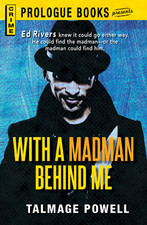 Some of the list is meant as a sample, for instance the two Wade Miller books I mentioned Tuesday that led to me reading deep into their catalog. Hocking gave me Guilty Bystander and Devil May Care with the thought that if I loved them I could investigate further.
Some of the list is meant as a sample, for instance the two Wade Miller books I mentioned Tuesday that led to me reading deep into their catalog. Hocking gave me Guilty Bystander and Devil May Care with the thought that if I loved them I could investigate further.
Some of the other entries on the list aren’t samples — they’re the best from that author, or the only work of that author in the mystery genre.
I’ve liked everything on the list that I’ve read so far, and I’ve loved most of it. I’ve been thinking lately that I should ask Hocking’s permission to share it with the rest of the world, although it won’t be half as useful without some notes from him, so I’ll try to pull him away from his many projects to draft a couple of sentences about each author or entry.
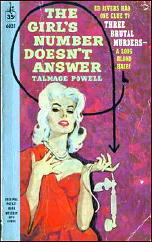 In the mean time I want to share a quartet of links about one of the other authors on the list. Here’s a discussion of the private eye fiction of Talmage Powell. Like Chris Hocking, J Kingston Pierce thinks the best of the five books are in the opening trio. I know that I certainly enjoyed the first three, enough that I went ahead and scooped up the last two (although I haven’t read them yet).
In the mean time I want to share a quartet of links about one of the other authors on the list. Here’s a discussion of the private eye fiction of Talmage Powell. Like Chris Hocking, J Kingston Pierce thinks the best of the five books are in the opening trio. I know that I certainly enjoyed the first three, enough that I went ahead and scooped up the last two (although I haven’t read them yet).
And here’s a gem of an article from 1997, reprinted by Vintage Library, that’s an actual interview with Talmage Powell about his writing process, working in the pulp era, and all kinds of observations about the writing and publishing life that should be of interest to writers even if you’re completely bored by my recent interest in noir. The Vintage Library is offering e-reprints of a whole host of Powell’s shorter works, though I don’t see his Ed Rivers novels in their catalog.
Finally, here’s a link to Prologue Books, which carries all of Talmage Powell’s Ed Rivers novels as e-books. Poke around there a while and you’ll see they also have e-additions of some Wade Miller titles, including all the Max Thursday books I mentioned Tuesday.
September 8, 2014
Noir Masters
 Over the last few months I’ve said that the fiction of the talented writer Wade Miller are must reads, and I thought I’d finally tell you why.
Over the last few months I’ve said that the fiction of the talented writer Wade Miller are must reads, and I thought I’d finally tell you why.
Bob Wade and Bill Miller wrote in tandem as a combination of their last two names, or as Dale Wilmer, or as Whit Masterson, up until Bill Miller’s untimely death at age 41 in 1961.The two created wonderful, twisting, unpredictable, satisfying noir. And they pulled the neat trick of delivering consistently excellent work story after story.
It was Chris Hocking who introduced me to them, sending me a copy of Devil May Care and the first private eye Max Thursday novel, Guilty Bystander. I could tell right away that he’d given me something amazing. As I dig deeper and deeper into their catalog, Wade and Miller continue to surprise me, which is hard to do to a jaded author constantly thinking about plot as he reads, and even harder to do to that author when he, I mean, I, am reading work from the same creators. Usually writers have favorite themes and some use the same plots and archetypes over and over (and over and over, in some cases). Sure, Wade and Miller have some favorite themes that recur, but they don’t like pulling the same trick twice.
 If they’re known at all it’s for their excellent Max Thursday private eye series, only six short books in length. I’ve enjoyed them so much that I’ve only read three so far. I don’t want to get to the end of the series too quickly, you see. The only other author whose work I’ve deliberately paced myself through to savor like that is Raymond Chandler, which is high praise.
If they’re known at all it’s for their excellent Max Thursday private eye series, only six short books in length. I’ve enjoyed them so much that I’ve only read three so far. I don’t want to get to the end of the series too quickly, you see. The only other author whose work I’ve deliberately paced myself through to savor like that is Raymond Chandler, which is high praise.
It’s not just their series work that’s worth tracking down, though. I have yet to find a book by them I didn’t enjoy. Even if their first, Deadly Weapon, had a few rough edges, it was still very fine. By their second they seemed to have mastered everything that they needed because I couldn’t tell it wasn’t written by a seasoned veteran.
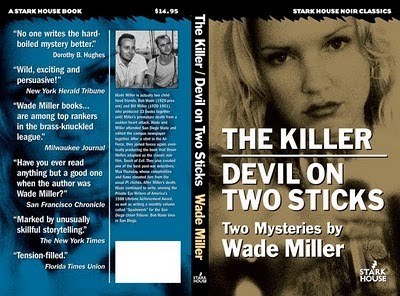 Wade and Miller have been reprinted over the years in several editions, though the work is so very good that I’m kind of shocked no one’s re-issued the books as a complete collection of some kind. As short as the old paperbacks are it would be easy to fit four or five per hardback.
Wade and Miller have been reprinted over the years in several editions, though the work is so very good that I’m kind of shocked no one’s re-issued the books as a complete collection of some kind. As short as the old paperbacks are it would be easy to fit four or five per hardback.
You can get all the Max Thursday books on Kindle now, but be careful that you don’t read too much about their plots if you look into write-ups about them, because a lot of people give away the endings! And unlike a lot of mystery/adventure novels, these really do have endings you don’t see coming.
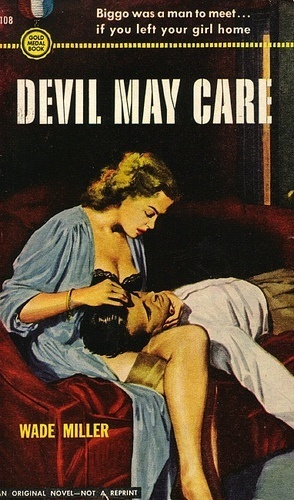 If you seek them out in their original editions it doesn’t look like you’ll be getting much. The covers are lurid and the phrases meant to entice readers from the ’40s and ’50s are blunt, coarse and often ridiculous. Devil May Care is one of their very best books, but you’d never guess its excellence from the text on the front of the old Gold Medal book: “You could trust him with your life but never with your woman.” The back cover text reads: “He was doing all right, until he met a hungry blonde in a bar in Mexico. She was hungry for his money, hungry for him, and even hungrier for his gun.” Nothing there suggests the subtle depths, the character arcs, the reversals and surprises and a whole host of wonderful little touches that are going to have me reading it again later this year.
If you seek them out in their original editions it doesn’t look like you’ll be getting much. The covers are lurid and the phrases meant to entice readers from the ’40s and ’50s are blunt, coarse and often ridiculous. Devil May Care is one of their very best books, but you’d never guess its excellence from the text on the front of the old Gold Medal book: “You could trust him with your life but never with your woman.” The back cover text reads: “He was doing all right, until he met a hungry blonde in a bar in Mexico. She was hungry for his money, hungry for him, and even hungrier for his gun.” Nothing there suggests the subtle depths, the character arcs, the reversals and surprises and a whole host of wonderful little touches that are going to have me reading it again later this year.
So what more will you find in these old paperbacks? Adventure with a capital A, complex characters, twisting plots. If you’ve loved the Stark books or the Fargo and Sundance novels I’ve talked about in previous entries, you will love these.
Are there caveats? You’ll see the assumption of racism or sexism in the parts of some characters, but rarely or almost never in the voices of the authors themselves. There are, of course, some dated features now and then, but as with any older work it’s something you have to accept on its own terms. And, honestly, there’s a lot less of it than I expected to see. I just finished off the third Max Thursday novel, and the principal female character was incredibly modern, capable, clever, and independent.
Here’s a link to an excellent page that discusses Wade Miller in depth and mostly spoiler-free. It likewise links to many of their books that are now available on Kindle (though not all of them), as well a list of all of the books written by the two authors. I like the work of Wade and Miller so well at this point that I’ve tracked down nearly everything and have read a vast swathe of it. I’m now scratching my head wondering how I’ll lay hands on their short stories…
September 5, 2014
Day After Day
September 3, 2014
Meandering Mission Statement
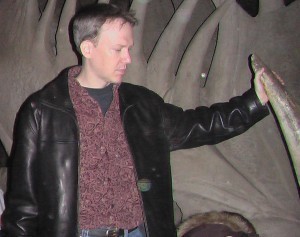 Sometimes I feel a generation removed from the important things that are happening in social media, and then I realize that there are plenty of people my age who ARE engaged in the arguments and concerns raging across Twitter or writer/publisher blogs. It’s just me, not my generation. I always learn about controversies and rumors weeks, months, or years later and have to explain to people I live in a hole. As much as I tell myself, “Och laddie, ye’ve got to change” (without using a terrible Scottish accent) my efforts to alter this aspect of my social behavior continue to fail.
Sometimes I feel a generation removed from the important things that are happening in social media, and then I realize that there are plenty of people my age who ARE engaged in the arguments and concerns raging across Twitter or writer/publisher blogs. It’s just me, not my generation. I always learn about controversies and rumors weeks, months, or years later and have to explain to people I live in a hole. As much as I tell myself, “Och laddie, ye’ve got to change” (without using a terrible Scottish accent) my efforts to alter this aspect of my social behavior continue to fail.
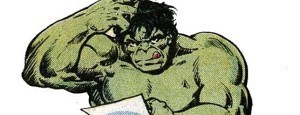 I still don’t really “get” Twitter. Perhaps I’m doing it wrong, but my impression seems to be that I have to pay constant attention to find conversations. It’s a time commitment that doesn’t interest me very much. Facebook I understand — I liken it to being in a long hallway with all of my old friends from work or wherever else, and we can share stuff around the water cooler when we need to take a break from what we’re working on.
I still don’t really “get” Twitter. Perhaps I’m doing it wrong, but my impression seems to be that I have to pay constant attention to find conversations. It’s a time commitment that doesn’t interest me very much. Facebook I understand — I liken it to being in a long hallway with all of my old friends from work or wherever else, and we can share stuff around the water cooler when we need to take a break from what we’re working on.
My sense of removal goes beyond Twitter. My mantra to young writers is to get involved in the industry and to get yourself to conventions, to meet and circulate and get involved in the business. That’s what I’ve done, inspired by my own interest and curiosity and its ended up benefitting me. Yet I don’t drop by other sites to weigh in on modern topics very often, if at all, and I have to constantly watch my tendency to read old, old books rather than keeping up to date with the sparkling new movements in fantasy. Is that reading preference because I have greater faith in the tried in true, or that having spent so much time reading older writers it’s easier for me to read MORE older writers? I wish I could say.
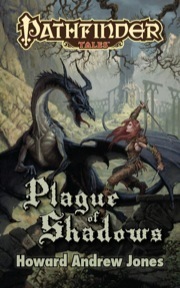 I’m pretty sure I know why I don’t hang out on other blog sites very much weighing in on various calls to arms. I think I believe what I believe quietly. It works for me, even if it doesn’t work for you. I have my hands full just trying to be a writer and a father and a husband. Yes, I think gay marriage should be legal. Yes, I think misogyny and all other prejudice sucks. I tackle social issues in my writing, but I rarely talk about it on a public stage. (Strange as it may seem, I have had an easier time addressing some of my issues in my Pathfinder novels — all with female leads, spoiler alert, who will NEVER get raped — than in my Arabian fantasy series, which I strove to write from the viewpoint of a man of his time, albeit one capable of change.)
I’m pretty sure I know why I don’t hang out on other blog sites very much weighing in on various calls to arms. I think I believe what I believe quietly. It works for me, even if it doesn’t work for you. I have my hands full just trying to be a writer and a father and a husband. Yes, I think gay marriage should be legal. Yes, I think misogyny and all other prejudice sucks. I tackle social issues in my writing, but I rarely talk about it on a public stage. (Strange as it may seem, I have had an easier time addressing some of my issues in my Pathfinder novels — all with female leads, spoiler alert, who will NEVER get raped — than in my Arabian fantasy series, which I strove to write from the viewpoint of a man of his time, albeit one capable of change.)
In my upcoming Hearthstones series some of these issues are front and center. I posit a society where sexual prejudice and preference isn’t even enough of an element of the principal culture to merit comment, to such an extent that I had to rethink the kind of insults that would be uttered by military characters when they’re training distracted newbies. (Have you ever thought about how many insults uttered by men concern themselves with sexual preference or comparison to the opposite sex?) I’m very proud of this work and can hardly wait for it to be seen by my reading public. Right now I’m drafting the detailed outline of the second book in the series.
These are intricate, involved, character driven novels but chock full of intrigue and adventure in an odd and, I hope, unique setting. I’m having so much fun writing them that I keep forgetting to go out and see what’s happening out there in blog land, or the Twitter verse, or elsewhere. And I guess I’ll probably continue to be.
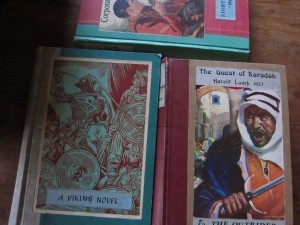
Three from the collection (click to embiggen).
And maybe that’s okay. If there’s one thing I’ve learned after 46 years on this planet it’s to be comfortable in my own skin. I’m a private person, not a confrontational one. I believe, deeply, in human rights and other matters. I just don’t feel like talking about them very much unless its within the work I’m writing, which is why this blog will continue to be primarily focused on old historicals, writing techniques, gaming, the original Star Trek, odd bits of music, and other things that have always delighted me. Controversy does NOT delight me. Maybe if it did I’d have scores and scores of additional visitors and commenters. But then this blog wouldn’t be a true reflection of who I am.
August 29, 2014
I Leveled Up
 …Or maybe I beamed up. In any case, I finished the rough draft of my seventh book yesterday. (In D&D terms does that make me a seventh level writer?)
…Or maybe I beamed up. In any case, I finished the rough draft of my seventh book yesterday. (In D&D terms does that make me a seventh level writer?)
So what did I do afterwards? I treated myself to a big ‘ol cheeseburger, owing to the fact that a far more delicious vietnamese dish is, alas, a 30 minute drive away. After that I sat down to start outlining book number eight. That’s what you do when you’re trying to make a living at this business. I did allow myself a little sense of satisfaction, however, because I stayed on target. I began the 90k manuscript on June 30, and I finished it in just under two months. That’s my fastest rough draft yet, undertaken with a solid outline, a firm knowledge of my characters, and steady work.
I’ll leave the current manuscript to cool on the window sill for a few days before I start revising. It’s nice to completely switch gears and work on something else.
In my spare time I finished the Captain Blood books, which I hope to discuss in depth at Black Gate in the near future. And I took the advice of James Reasoner and Morgan Holmes, who both commented in my Pulp Swashbuckler‘s post last month, suggesting I try some of the work of F. van Wyck Mason.
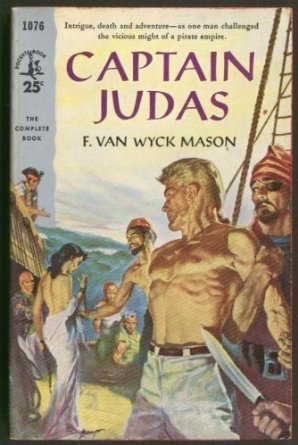 Mason’s going to be getting a whole post of his own, soon. The first two books have been swift reads, and have done a better job of schooling me in sailor talk than any other historical fiction I’ve ever read, and that includes the Hornblower books. Captain Nemesis had some rough plotting, but Captain Judas rollicked along nicely. It’s one thing to read up on how these old ships worked, but it’s another to see how a good writer brings all those details to life. I’ve definitely been making some notes about improvements I need to make in the speech of my characters when I tackle the revisions of the last two books.
Mason’s going to be getting a whole post of his own, soon. The first two books have been swift reads, and have done a better job of schooling me in sailor talk than any other historical fiction I’ve ever read, and that includes the Hornblower books. Captain Nemesis had some rough plotting, but Captain Judas rollicked along nicely. It’s one thing to read up on how these old ships worked, but it’s another to see how a good writer brings all those details to life. I’ve definitely been making some notes about improvements I need to make in the speech of my characters when I tackle the revisions of the last two books.
There’s no sailing at all in the newest one, so I can go back to plain old common experience with my own horses to bring transport in this one to life.
I’ll just add one more thing — this book writing stuff does get less taxing. Book two was harder than book one, and books three and four were a little like pulling teeth, but steady work had rendered the process simpler.
Writing well still takes discipline and concentration — but just as writer Troy Denning was saying to me at GenCon, the more books you work on, the more you get an instinctive sense of the ebb and flow of the process. I’m starting to sense when a different scene is needed than one planned, when a character needs to be cut, to stop before I go too far down the wrong path and write a bunch of chapters that have to be eliminated. There are other things, too, that I’m getting right by feel more than through conscious thought, so that the rough drafts aren’t as rough.
Now some of my writer friends out there have done this instinctively from the beginning. As for me, I’ve had to learn. Slowly but steadily I’m getting it all worked out. I’m sure I’ll keep discovering new mistakes to make, but in the mean time I feel like I’m learning better about how to work hard AND smart in this crazy business I’ve decided to make my own. David Coe (aka D.B. Jackson) wrote about this at Black Gate just a few months back, and I didn’t have the wit to remember it was his essay that had resonated so strongly with me when I met him in person. I’m terrible with names…
August 27, 2014
Character Death
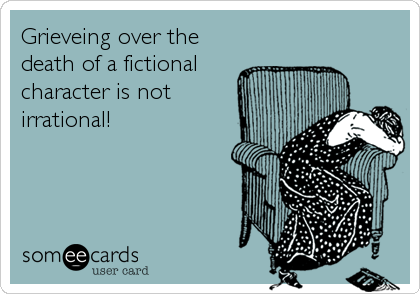 Most people reading popular modern fantasy are used to seeing characters die, maybe even popular characters. On the other side of the text it can be hard to pull the trigger even if the plot demands it. You grow attached to those characters.
Most people reading popular modern fantasy are used to seeing characters die, maybe even popular characters. On the other side of the text it can be hard to pull the trigger even if the plot demands it. You grow attached to those characters.
Sometimes, though, it’s harder than usual. Yesterday as I was writing some of the final scene of my newest book I suddenly realized the scene would be heightened if one of the characters died.
I was already running out of interesting scenes that featured a particular character, and I’m balancing a rather large cast, so it seemed as though it would be one of those spontaneous decisions that would improve the book. The death didn’t even change the outline because the character didn’t get a mention in the final sections.
And yet once I wrote the scene and its aftermath, I myself felt as though I was going into mourning. It didn’t take me long to realize why.
Back when I regularly collected rejection letters for short stories I was working with a pretty generic couple of characters. I didn’t keep much from those old stories, but I did keep some of their names, and some of the descriptions, and this particular character was one of those guys — one of the lead ones, in fact, a fellow I once liked enough to try featuring in multiple tales. I’ve recycled a number of them as supporting characters into various projects. This guy had a similar name and a similar description to that original character — but like me he was at least twenty years older.
I’d known the guy since I was a teenager, and I’d just written a death scene for him. I didn’t burst into tears, but all the sudden I felt pretty somber. And older. But then a lot of stuff I do these days reminds me that I’m getting older…
So any of you out there have character death stories you want to share? You think there’s anything fellow writers can learn tom this sort of thing?
August 25, 2014
Blog Hop: My Writing Process & 3 Writers You Want to Meet
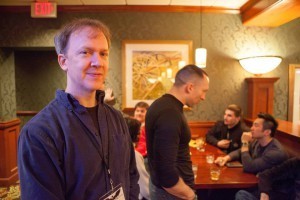 Many thanks to my old friend Lillian Duggan for inviting me to take part in the “My Writing Process” Blog Hop. I’ve known Lillian since we were proofreaders and then editors at Macmillan Computer Publishing some twenty years ago when we were barely in our twenties ourselves. We’ve kept in touch through the years, and she’s developed a passion for writing and all things Spanish, especially Spain. In recent years she’s honed her español skills and begun translating from Spanish to English. Over the years she’s been paid to write and/or edit textbooks, news articles, financial articles, and computer books, and had her short story, The Orchid, published online in August of 2013. You can find her online here.
Many thanks to my old friend Lillian Duggan for inviting me to take part in the “My Writing Process” Blog Hop. I’ve known Lillian since we were proofreaders and then editors at Macmillan Computer Publishing some twenty years ago when we were barely in our twenties ourselves. We’ve kept in touch through the years, and she’s developed a passion for writing and all things Spanish, especially Spain. In recent years she’s honed her español skills and begun translating from Spanish to English. Over the years she’s been paid to write and/or edit textbooks, news articles, financial articles, and computer books, and had her short story, The Orchid, published online in August of 2013. You can find her online here.
For this Blog Hop, I’ll answer a few questions about my writing process and then introduce you to three other writers who will pass the Blog Hop along. At least that’s the theory. I was tapped for this last month and you can see that I haven’t exactly been quick on the draw. Deadlines. Always deadlines. Anyway, as to those questions:
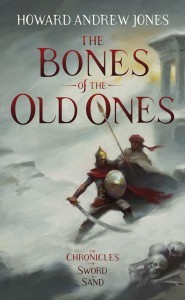 1. What am I working on?
1. What am I working on?Right now I’m about 80 thousand words into the rough draft of what will be an approximately 90 thousand word novel titled Through the Gate in the Sea, a sequel to the book I wrote earlier this summer titled Beyond the Pool of Stars. Both are set in the Pathfinder Tales world of Gorarion, but are independent of the earlier books I wrote for Paizo in that none of the same characters appear.
2. How does my work differ from others of its genre?
Set as they are down in the tropics, these two books will have a very different feel from other Pathfinder novels. I downplay the more familiar Tolkienesque aspects and place a great deal of emphasis upon the collision of motivations between the colonials and natives, not to mention the indigenous races, like the lizard folk. They share some similarities with the fine Pathfinder Tales novel by Chris Jackson, Pirate’s Honor, owing to some moments upon the sea and a tropical setting, but the situations are very different.
And then, as with all my Pathfinder Tales novels, the central protagonist is female, a Pathfinder and leader of an underwater salvage team. She’s the first woman of color to have the lead in a Pathfinder Tales novel and she’s featured on a great cover I can hardly wait to show you.
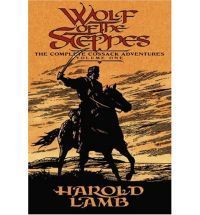 3. Why do I write what I do?
3. Why do I write what I do?I’m a sucker for adventure stories. Whether I’m writing for Paizo, or at work on a series for the Thomas Dunne imprint of St. Martin’s (something I’ll be working on again just as soon as I finish this particular book) you can bet that I’m drafting a tale with swashbuckling. I’d like to think that every one of my books has something more going for it, that it’s not just a hack-and-slash romp and that there are themes and messages behind it as well. The best of the original Star Trek episodes always managed to deliver a little message along with the adventure (the worst reversed it so that they were incredibly heavy-handed) and, having grown up watching them I suppose attempting the same is in my DNA.
But I’m drawn to the swashbuckling because I love the worlds of certain fantasy and historical fiction writers and wanted to try my hand at something similar. I’ve written variously about Harold Lamb and Leigh Brackett and Robert E. Howard and Fritz Leiber and Roger Zelazny and many others, and you can feel free to follow links to those posts for more details about why I found each of them inspiring.
 4. How does my writing process work?
4. How does my writing process work?If you’re a regular visitor you probably know the answers to those questions, as I can hardly be persuaded to shut up about my process. I talk about it frequently as it evolves in the hope that someone else will find it of use. Here’s a link to a whole series of posts (start with the outlining section), but in simple form I figure out who my protagonists are, who the villain is, and then what everybody wants. Then I sit down and write a detailed outline. From that I go through the book and write a sort of stagey version of the draft. If I feel compelled to add lots of description during that draft, I do, but if it trims down to something like a play with occasional stage directions I don’t mind. The goal is to get the structure all worked out in the rough draft, and all the beats and players in place.
After the first draft I go back through and fix it up and work on dropping in the description and metaphors. Usually it’s there that the minor characters get some additional personality grafted on through tics and clever (hopefully) revealing bits of dialogue.
And now I’m passing the Blog Hop baton to Lou Anders, Chris A. Jackson, and Josh Vogt. Visit their own sites, where they’ll be answering these same questions over the next few weeks.
Lou Anders‘s research on Norse mythology while writing Frostborn turned into a love affair with Viking culture and a first visit to Norway. He hopes the series will appeal to boys and girls equally. Anders is the recipient of a Hugo Award for editing and a Chesley Award for art direction. He has published over 500 articles and stories on science fiction and fantasy television and literature. Frostborn, which Publishers Weekly described as “thoroughly enjoyable” (starred review), is his first middle grade novel. A prolific speaker, Anders regularly attends writing conventions around the country. He and his family reside in Birmingham, Alabama. You can visit Anders online at louanders.com and ThronesandBones.com, on Facebook, and on Twitter at @ThronesandBones.
A sailing writer, or writing sailor (he’s still not sure which), Chris A. Jackson is living his dream. Sailing full time since 2009, he and his wife are dividing their time between cruising the Caribbean and writing fantasy. While nautical fantasy came naturally—his Scimitar Seas novels have won multiple awards, and his debut Pathfinder Tales novel, Pirate’s Honor, received high praise—his other works have earned an incredible fan following as well. The Weapon of Flesh Trilogy has become a Kindle bestseller, spurring international interest. Privateer Press recently released Blood and Iron, his first work in the Iron Kingdoms world, and he is currently working on short fiction for Catalyst Game Labs, in the Shadowrun world, a longtime dream. His second novel for Paizo, Pirate’s Promise, will hit the shelf in December 2014, and his third is in the works. You can visit Chris online at jaxbooks.com, or keep up with him on Facebook, as well as Twitter at @ChrisAJackson1.
A full-time freelance writer and editor, Josh Vogt has been published in markets such as Paizo’s Pathfinder Tales, Grey Matter Press, the UFO2 & UFO3 anthologies, Intergalactic Medicine Show, and Shimmer, among others. He writes for a variety of RPG developers and his debut fantasy novel is forthcoming. You can find him at JRVogt.com or @JRVogt. He is made out of meat.
August 22, 2014
Sailing with Sabatini
 I returned from GenCon with a whole host of goodies I’ll slowly be working through, and I still mean to dedicate an entire post to the work of the talented Kevin Crawford. Briefly, though, I want to talk Sabatini.
I returned from GenCon with a whole host of goodies I’ll slowly be working through, and I still mean to dedicate an entire post to the work of the talented Kevin Crawford. Briefly, though, I want to talk Sabatini.
You may know Sabatini from Captain Blood, or Scaramouche, or, possibly, The Sea Hawk. The odds are fair that you know those titles more through Errol Flynn movies than through prose.
I’ve had mixed luck with Rafael Sabatini. Knowing that he was a giant in the historical fiction field which, naturally, has a huge influence upon fantasy adventure stories, I first tried out his work some twenty years ago. I remember enjoying Captain Blood but bouncing off of Scaramouche because the opening didn’t grip me.
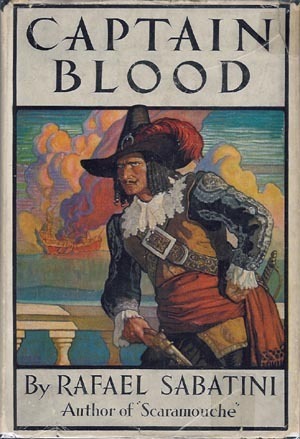
Nowadays I’m less patient for a story to start working but more patient with a story’s own intent and genre conceits. That means I’ll probably try Scaramouche again, since it’s accorded by a lot of Sabatini fans to be his best book. It’s the one that converted him from a low mid-list writer to a best-seller.
The funny thing is that while I remember the gist of Captain Blood, I don’t recall very many specific moments, so I may revisit it as well, especially after having dipped into its followups. Yes, Sabatini has two sequels, but they’re short story collections, not novels, Captain Blood Returns (aka The Chronicles of Captain Blood) and The Fortunes of Captain Blood. Apparently there’s a final Blood short story in a separate Sabatini collection, and I may have to track it down because in these shorter narratives Sabatini really shines.
The short stories occur in gaps in the novel, and every one of them I’ve read has been grand, rollicking fun. Blood outwits his enemies via his wits, relying on clever tactics, bluff, and charade. I honestly don’t recall the novel being this enjoyable.
 Sabatini’s style is obviously a little dated (why wouldn’t it be?) but that’s part of the charm, and these are hardly slow paced. What’s more, you can practically feel the tropic sun on your back and the gentle breezes over turquoise waves. Certainly you can hear the roar of cannons and the clink of swords. It’s also refreshing to read stories about a character with such a strong moral code.
Sabatini’s style is obviously a little dated (why wouldn’t it be?) but that’s part of the charm, and these are hardly slow paced. What’s more, you can practically feel the tropic sun on your back and the gentle breezes over turquoise waves. Certainly you can hear the roar of cannons and the clink of swords. It’s also refreshing to read stories about a character with such a strong moral code.
You have to take the Blood stories on their own terms, of course. Most of Blood’s allies are lightly sketched, and, alas, I’ve yet to find any women with much agency. That was pretty typical of writing for the time — men were the doers and women were the prizes — but not all adventure writers were so blind to the possibility of women actors. Harold Lamb, for instance, writing at the same time, frequently featured shrewd women who were central to his plots.
In any case, I’ll be reading more Sabatini now. Before I try Scaramouche again I might try The Black Swan, which, according to some sources, may be his best pirate novel of all. It’s one of his later books and relatively more obscure.
August 19, 2014
Return from the Con
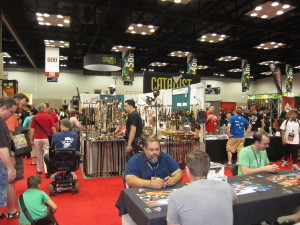
A low traffic moment in the Great Hall.
Last year I wrote a long account of my many GenCon adventures in part so those who’ve never been to the convention could have some sense of what it’s like. You can find those accounts here (part 1, 2, 3, and 4) if so inclined, as well as a post on why conventions are worth attending. This year I’ll be a little more to the point, owing to book deadlines and my own worry that so many blog posts about the convention might have bored visitors.
Paizo took fabulous care of me, as always, and I’d like to extend a hearty thanks to the entire staff for being so supportive and friendly. Marc Tassin and his amazing band of volunteers raised the bar again on the GenCon Writer’s Symposium. Judging from compliments I heard outside the panels, attendees were very happy with the information we provided, and I know that on the other side we thought we were doing a pretty good job staying on topic and providing data that our fellow writers would find of use.
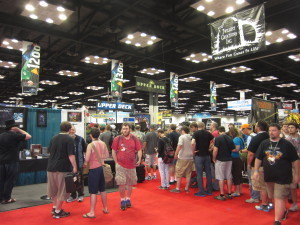
A high traffic moment in the Great Hall.
As always, at a convention you’ve visited before you deepen some friendships, transform some acquaintances into friends, and occasionally hit it off so well with others they move straight over to the friend column.
I met a lot of fans, which is always a blast, although my favorite was the young girl who came by with her parents to tell me how much she loved my Pathfinder Tales novels because of the heroic leading lady. I hope any adventure lover will enjoy these novels, of course, but I write all of my Pathfinder novels particularly with young girls in mind because I aim to present them with heroic leading role-models. I have a daughter myself! I forgot to show her the new action figure of Elyana, but I did tell her just a little about the upcoming novels.
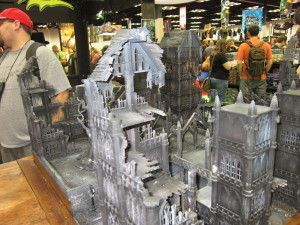
A great setting from Wyrd Miniatures.
Naturally I came back with some treasures, among them my Kickstarter copy of Primeval Thule, Erin M. Evans‘ The Adversary, and various gaming odds and ends. The Great Hall was even larger this year than last. I’m pretty sure I STILL never saw all the booths, despite lots of roaming.
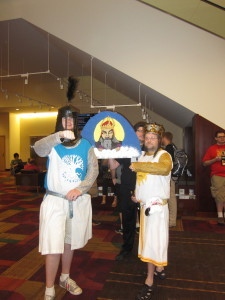
These gents were in the hallway looking for a grail.
In short, I had a great time. I look forward to my return next year. I somehow avoided coming home with any con crud, although I’m still a little sleep deprived.
It’s always just a little sad coming back from a convention after being surrounded by fellow professionals. Writing is a lonely business, after all, and it’s pretty great to be able to wander out of your hallway every evening and chat with others in the same field. On the other hand, I really missed my family, and it’s great to be among them once more.
Click on any of these pictures to enlarge. Hopefully most of them are in focus!

Apparently there’s a new Spartacus board game. With expansions! Why am I always the last to learn these things?
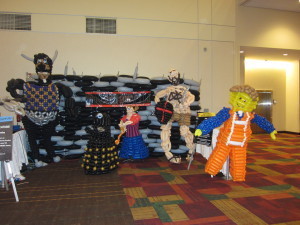
More cool corridor decorations.

Towers of cards.
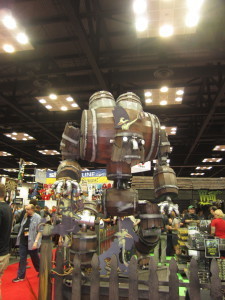
I forgot to note what this display, also at Wyrd Miniatures, was called. I’m going with “Beer Keg Golem.” Someone should stat this up.
Howard Andrew Jones's Blog
- Howard Andrew Jones's profile
- 368 followers


 A musical break today with one of my favorite bands.
A musical break today with one of my favorite bands. 
